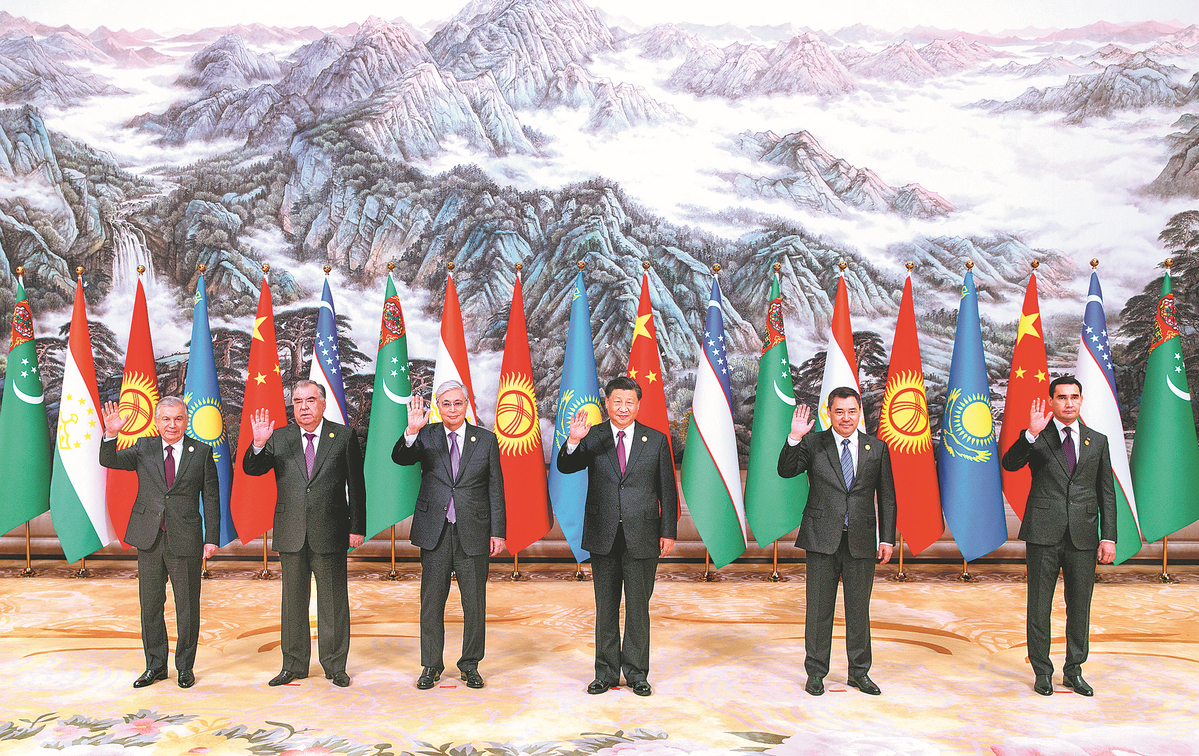Summit charts course for cooperation


Leaders of China, Central Asia vow to work together for an even closer shared future
The China-Central Asia Summit, which concluded on Friday with fruitful achievements, has been hailed by political analysts and business executives as a milestone event.
They said the summit creates a model of cooperation featuring high-level complementarity and mutual benefit, and contributes to international fairness and justice in a world full of uncertainties.
During the summit in Xi'an, Shaanxi province, President Xi Jinping, together with Kazakh President Kassym-Jomart Tokayev, Kyrgyz President Sadyr Japarov, Tajik President Emomali Rahmon, Turkmen President Serdar Berdimuhamedov and Uzbek President Shavkat Mirziyoyev, reached a wide consensus on cooperation.
They pledged to work together for an even closer China-Central Asia community with a shared future featuring mutual assistance, common development, universal security and everlasting friendship.
The heads of state of the six countries jointly signed the Xi'an Declaration of the China-Central Asia Summit and charted a blueprint for the future development of China-Central Asia relations.
During the summit, China and the five Central Asian countries signed seven bilateral and multilateral documents as well as over 100 cooperation agreements.
In his keynote address to the summit, Xi announced that, to bolster cooperation with Central Asia, China will provide Central Asian countries with a total of 26 billion yuan ($3.7 billion) of financing support and grants.
He highlighted that the world needs a harmonious Central Asia, saying: "No one has the right to sow discord or stoke confrontation in the region, let alone seek selfish political interests."
In a media interview after the conclusion of the summit, State Councilor and Foreign Minister Qin Gang said the summit provided new impetus for deepening China-Central Asia relations.
China and the Central Asian countries unanimously agreed to firmly defend multilateralism and resist unilateralism, hegemonism and power politics, injecting more certainty into a world full of uncertainties, Qin said.
S.L. Kanthan, a geopolitical analyst based in Bangalore, India, said the summit, which focused on peace, development, trade, infrastructure and cultural and people-to-people exchanges, was a genuine reflection of China's diplomatic, economic and cultural principles.
"China promotes cooperation and trade while the US spreads conflicts and wars. China promotes wholesome culture and traditional values while the US spreads destructive hedonism and divisive identity politics. China promotes a multipolar world of shared prosperity while the US imposes a unipolar world, with itself as the dictatorial hegemon," he added.
The choice is obvious for the rest of the world: perpetual wars and chaos versus peace, connectivity, trade and development, Kanthan added.
While meeting the media with the five Central Asian leaders on Friday, Xi said that China and the Central Asian countries will take the 10th anniversary of Belt and Road cooperation as a new starting point to build better synergy among development strategies, promote trade liberalization and facilitation, expand industrial and investment cooperation, and further develop transport corridors connecting China and Central Asia.
"Together, we will foster a new cooperation paradigm featuring high-level complementarity and mutual benefit," Xi said.
Looking forward, Xi said that China's relations with Central Asian countries will "forge ahead like a ship braving all winds and waves", offer new vitality to the development and revitalization of the six countries, and inject strong, positive energy to the peace and stability of the region.
Zafar Uddin Mahmood, former special envoy for the China-Pakistan Economic Corridor, said that what impressed him most about the summit was the spirit of optimism, harmony, cooperation, inclusiveness, engagement and stability.
"The conference discussed peace, development, cooperation and common prosperity, and a brighter future for people in the region. At the same time, the G7 Summit was talking about sanctions, confrontation, pessimism, decoupling, exclusiveness and disengagement," he said.
As part of the fruitful achievements of the Xi'an summit, China and the five Central Asian countries agreed to support the establishment of a China-Central Asia energy development partnership to expand full-chain energy cooperation.
The declaration released after the summit said that the six countries will further expand their partnership in traditional energy, such as in petroleum, natural gas and coal, strengthen renewable energy cooperation and intensify collaboration in the peaceful use of nuclear energy.
Noting that their energy partnership is an important part of sustainable development in the region, the six countries underlined the importance of a stable energy supply to economic, trade and investment cooperation, and expressed support for speeding up construction of the D line of China-Central Asia natural gas pipeline, according to the declaration.
Nan Yi, chairman of Universal Energy, a Chinese renewable energy company based in Shanghai, said the company signed a 500-megawatt wind power cooperation investment agreement with the Ministry of Energy of Uzbekistan, and a memorandum of understanding with the Ministry of Energy of Kyrgyzstan during the summit.
"The summit greatly promoted economic and trade cooperation between China and Central Asian countries, and our company, for example, fully enjoyed the dividends brought by the summit," he said.
"It further deepens our business expansion in Central Asia and also helps to enhance mutual benefits and promote win-win cooperation in the region."
The six countries officially inaugurated the China-Central Asia Summit Mechanism, with China and Central Asian countries taking turns to host the biennial summit. They agreed that the second China-Central Asia Summit will be hosted by Kazakhstan in 2025.The six countries will work to flesh out the mechanism, and establish a permanent secretariat in China.
Xing Yi in London and Xu Weiwei in Hong Kong contributed to this story.
- Poverty alleviation efforts pay off
- Journey to a greener future
- AI Broadcast: Qufu honors Confucius with cultural fest
- Global journalists, influencers explore legacy of Confucius
- Renmin University's new Tongzhou campus officially opens
- China's top political advisor urges renewed efforts in building community for Chinese nation





































